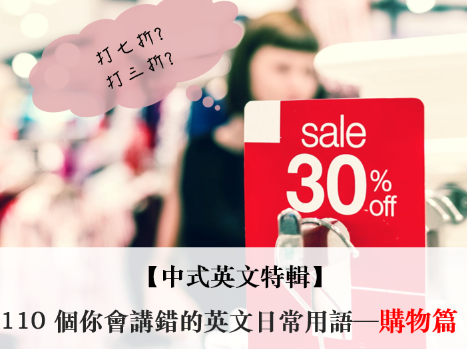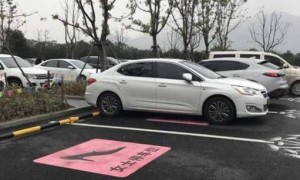打八折 20% off
(X) 80% off
虽然在台湾大家很习惯讲打八折、打七折等,但外国人其实不是这样说的。介系词 off 有「去掉」的意思,打八折就是去掉两折,所以是 20% off;相反的,如果你说 80% off 就会是打两折的意思。如果大家看到有哪些店有挂上 80% off 的牌子,有可能是店家弄错了,不然的话就…记得来联络小 V 去抢购啊!
另外,我们常常看到类似「全面 7 折起」,英文的说法是 up to 30% off,up to 的意思是指「至多…」,所以 up to 30% off 就是最多打七折。
Jim: What should we get to drink?
Jim: 我们要买些什么来喝?
Bob: White wine? this bottle is 20 percent off.
Bob: 白酒呢?这瓶打八折。
Jim: Wine? Since when did you become all fancy?
Jim: 葡萄酒?你什么时候开始喜欢喝的?
Bob: What’s wrong with wine?
Bob: 喝葡萄酒有什么不好?
Jim: With our budget? I suggest sticking to beer.
Jim: 就用我们这点预算来买?我觉得还是啤酒好了。
Bob: Fine … luckily beer is also 20 percent off.
Bob: 好吧… 幸好啤酒也是八折。
价格合理的 The price is reasonable.
(X) The price is suitable.
当我们在讲一个物品的价钱是「合理的」时,要使用 reasonable,而不是 suitable ,suitable 意思是「合适的;适宜的」,用来指对某人或物而言为合适或不合适的。
“Game of Thrones” is not suitable for children.
《权力游戏》不适宜儿童观看。
reasonable 也是形容词,意思有「公平的,讲道理的;可接受的,尚好的」或是指在价钱方面「公道的,不太贵的」。所以当我们说某物的价格为合理的时候应该要用 reasonable。
Kim: 4,000 … seems a little expensive for a denim jacket.
Kim: 四千…买一件牛仔外套好像有点贵。
Gordon: I think the price is quite reasonable.
Gordon: 我觉得这价钱很合理。

Kim: But it’s second-hand! I could get a new one for 1,000.
Kim: 但是这是二手的!买一件新的才只要一千。
Gordon: A vintage jacket will last much longer than a new one.
Gordon: 复古外套会比新的更耐穿。
Kim: True. I’ve heard new stuff is designed to break.
Kim: 也是,听说新的东西设计都很容易破。
Gordon: That’s how they keep you buying more.
Gordon: 这也就是他们让你一直买新东西的手法。
价格太贵/便宜 The price is too high. / The price is too low.
(X) The price is too expensive/cheap.
expensive 或 cheap 本身的意思就是某物是「昂贵的」或是「便宜的」了,所以只会用来形容物品本身,但是价格是一种「数字」,所以我们就要用 high (高) 或 low (低) 来描述。
Kurt: That price is too high for tomatoes.
Kurt: 这价钱对蕃茄来说也太贵了。
Courtney: If anything that price is too low.
Courtney: 它们的价钱不可能太便宜的。
Kurt: What do you mean? I’ve bought them for half that before.
Kurt: 什么意思?我之前买过半价。
Courtney: Sure, but that was when they were in season.
Courtney: 当然,但那是当季的时候。
Kurt: I guess.
Kurt: 我想也是。
Courtney: You should be glad you can get tomatoes at all at this time of year.
Courtney: 这个时候你还能买到番茄就要偷笑了。
这在特价 It’s on sale.
(X) It’s for sale.
for sale 和 on sale 只有一个介系词之隔,但意思可是天差地远哦! for sale 是指商品「出售中」,而若要指某商品正在「特价」,要使用 on sale。
Eva: I’m thinking about getting a surfboard …
Eva: 我想要买个冲浪板…
Dennis: What? But you don’t even surf!
Dennis: 什么?但你根本不会冲浪!
Eva: Yeah but it’s on sale!
Eva: 是啊,但在特价耶!
Dennis: You can’t even swim!
Dennis: 你根本不会游泳!
Eva: Well … I can learn.
Eva: 这个嘛…我可以学啊。
Dennis: That’s what you said about that piano you bought last year.
Dennis: 你去年买那台钢琴的时候也是这么说。
CP 值很高 It’s a real bargain.
(X) The CP rate is high.
CP 值的英文其实是 cost-performance ratio,中文叫做「性价比」,是一个经济学与工程学的专业名词。当我们在说某个东西 CP 值很高的时候,就是在指某个东西买起来很划算,那我们用英文到底可以怎么说?以下几种用法都可以指某物很划算:
❄ It’s a real bargain.
❄ It’s a great deal.
❄ It’s a steal. (这边可不是说东西是偷来的,而是形容就像偷来的一样划算)
Clarence: How much is that smartphone?
Clarence: 这支手机多少钱?
Bruce: only 5,000. Plus another 20 percent off for members.
Bruce: 只要五千,会员还打八折。
Clarence: That’s a real bargain.
Clarence: 很划算耶。
Bruce: Yeah, but I’m still not sure. I might wait.
Bruce: 对啊,但我还在想,我想我要再等等。
Clarence: How come?
Clarence: 为什么?
Bruce: I’ve heard it’s going to be in the sale next week.
Bruce: 听说下礼拜会有特价。
我可以试穿________吗? Can I try ________ on? / Can I try on ________?
(X) Can I try ________?
try 本身有「尝试」的意思,也可以指试吃食物。
Can I try the original flavor frozen yogurt?
我可以试吃看看原味的冷冻优格吗?
那如果是要「试用」化妆品或什么东西时,就要使用 try out。
I like this lipstick color, can I try it out?
我喜欢这口红的颜色,我可以试试看吗?
最后我们的重点,也就是「试穿」,则是要使用 try on 哦!
Alan: We never sell anything here.
Alan: 我们这里的东西从来都卖不出去。
Clare: No wonder. Look how expensive this is!
Clare: 难怪,看看这个有多贵!
Alan: Especially for something that ugly.
Alan: 特别是这东西又那么丑。
Clare: Can I try it on?
Clare: 我可以试穿吗?
Alan: What for?
Alan: 要干嘛?
Clare: Well … maybe someone as fashionable as me can make it work!
Clare: 这个嘛…或许像我这样时髦的人穿很可以!
多少钱? How much is it?
(X) How many money?
money (钱) 是一个不可数的名词,所以我们要用 much 来修饰。 much 后方接不可数名词,而 many 后方只能接可数名词。询问量的多寡可以用 how much 开头。 How much is it? 指的是询问某件单一物品多少钱,若要询问多件物品的价钱则可用 How much are they?。
Jack: Thanks for coming to the gallery opening.
Jack: 谢谢你来参加艺廊的开幕活动。
Steph: No problem, although I think most of this is out of my price range …
Steph: 不会,虽然大部分画作都超出我的预算…
Jack: This painting is quite affordable.
Jack: 这画作价格应该还可以负担。
Steph: How much is it?
Steph: 多少钱?
Jack: 5 million.
Jack: 五百万。
Steph: (joking) Oh, what a pity! I only have 4 million on me …
Steph: (开玩笑) 喔,真可惜!我刚好身上只有四百万…
老客户 regular guest/customer
(X) old customer
今天的最后一组生活用语,就是「老客户」。当我们用英文在说「老客户」时,可不能直接直翻成 old customer ,old customer 听起来可能会被误会成年纪很大的客户,使用上一定要小心喔!那么到底该怎么说呢?我们可以用 regular guest/customer。 regular 这个字有「频繁的;经常的」的意思,可以用来形容「经常光顾的客人」。口语上也常常直接用 regular 来称呼常客。
Janice: I’m amazed this place is still open.
Janice: 我很讶异这店还开着。
Shane: I know. We’re the last record store in the city.
Shane: 我知道,我们是这城市里最后一间唱片店了。
Janice: You’re lucky. Most people buy music online now.
Janice: 你真幸运,大部分的人现在都线上购买音乐了。
Shane: Thankfully our regular customers keep us going.
Shane: 感谢我们的老顾客一直光顾。
Janice: It’s a place to socialize as well now that you sell coffee.
Janice: 你现在有卖咖啡那这里也变成了一个大家社交的好地方了。
Shane: A home away from home for our regulars.
Shane: 对我们的常客来说是另外一个家。







